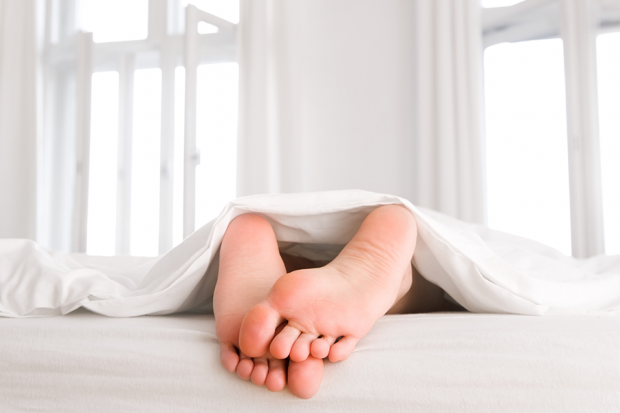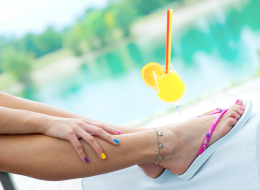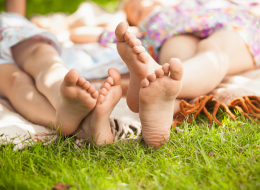Oh So Smelly Stinky Feet Causes And Remedies
Find out what’s likely causing your stinky feet and learn the best remedies to quickly get rid of smelly foot odor for good.
Having stinky feet isn’t just a man problem. Foot odor is a common issue that affects men, women, children and even babies. Fortunately, it’s actually pretty easy to cure smelly feet and keep nasty foot odors at bay. It’s all about learning what causes stinky feet in the first place.
Quickly Take Me To: Foot Odor Causes
Quickly Take Me To: Foot Odor Remedies
Why Do Feet Get Smelly?
Human feet have an impressive 250,000 sweat glands per foot that help with body temperature regulation and comfort. Your feet also host quite a party of different bacteria, and when the normally present bacteria start to feed on your foot sweat, an odorous acid is released.
While many people don’t experience strong foot odor from this process, others experience stinky feet that aren’t only problematic, but embarrassing. These people, according to Jane E. Andersen, a doctor of podiatric medicine and spokeswoman for the American Podiatric Medical Association, “have more bacteria on the skin than others or more sweat than others or a combination of the two.”
Common Causes Of Stinky Feet
Several things can lead to foot odor — called bromodosis in the medical world — or an excess of foot sweat and bacteria. They include:
MORE FROM FOOTFILES:
- Synthetic Shoes: Shoes made from synthetic, non-breathable materials often cause foot odor because foot sweat gets trapped inside and is unable to evaporate.
- Worn Shoes Or Socks: Over time, dead skin and bacteria build up in shoes and can start to create a strong odor. When you slide your foot in — even if it’s freshly scrubbed and clean — the stinky bacteria begin to quickly repopulate and create odor. Meanwhile, dirty socks or socks that aren’t washed in water hot enough to kill bacteria may harbor odor and bacteria that continue to repopulate when they come into contact with your feet.
- Dry Foot Skin: Bacteria on your feet don't just love chowing down on foot sweat. Bacteria also love to feed on dry foot skin and calluses, and they release odor when they nosh on the flaky bits of skin.
- Hormones: Some doctors believe that hormones have something to do with excess foot sweat, which is why many children and babies suffer from foot odor. Most children grow out of the condition, but not all. Meanwhile, many women experience smelly feet during pregnancy due to hormonal changes.
- Stress Or Anxiety: People who experience high levels of stress and/or anxiety typically have stinky feet due to the increased level of sweat the body produces with these emotions.
- Plantar Hyperhidrosis: This is a foot condition in which sweat glands on the feet malfunction and cause copious amounts of foot sweat. A half a pint of foot sweat each day is considered normal; any more than that, and you likely have plantar hyperhidrosis.
- Athletes Foot: Athletes Foot is a common foot fungal infection that can create a malodorous, sour smell. Symptoms include redness, itchiness and cracked skin, especially between the toes. If you have foot odor that won’t go away no matter what you try, chances are you have a fungal infection that can only be cured with medication or one of these home remedies for Athlete's Foot.
Foot Odor Remedies
All it usually takes to eliminate foot odor is to eliminate excess foot sweat, bacteria and dry skin. At the bare minimum, here's what you should do to cure stinky feet:
MORE FROM FOOTFILES:
- WASH: Be sure to really wash your feet every day to get rid of sweat and bacteria. And we don't mean just rinsing them while you're in the shower becasue you think your body soap is doing all the work as it runs over your feet before jetting down the drain. Really scrub both feet, preferably with anti-bacterial soap, to get rid of odor causing gunk.
- EXFOLIATE: Work exfoliation into your foot care routine so the grime and dry skin bacteria like to feed on is consistently sloughed away. Use a pumice stone, a foot file or one of these homemade foot scrubs a couple times per week to help keep your feet seriously smooth and odor free.
- DRY: Always be sure to thoroughly dry your feet after showers, baths and soaks to keep excess moisture at bay.
- SOCK UP: Wear moisture-wicking socks to help absorb foot sweat. Acrylic blend socks are great for the summer, while Merino wool socks work wonders in the winter. Be sure to wash your socks in very hot water to kill bacteria that accumulate throughout the day.
- CHOOSE THE RIGHT SHOES: Choose shoes made from natural, breathable material like canvas or leather so your feet consistently are exposed to fresh air. You can also try slipping your feet out several times throughout the day to further air out both the shoes and your feet.
- WEAR MULTIPLE PAIRS OF SHOES: Alternate between at least two pair of shoes each day so you never wear the same pair two days in a row. This ensures that your shoes are completely dry and most of the bacteria has died out before you wear them again.
More You Can Do To Tackle Stinky Feet
For serious cases of smelly feet, you may have to add a few more steps to your foot odor cure. Some additional methods you can use to cut down on foot smell include:
- Spraying the bottom of your feet with antiperspirant to help reduce foot sweat
- Sprinkling baby powder in your shoes to help absorb excess moisture
- Frequently spraying your shoes with Febreze or other shoe odor sprays
- Using an odor-eliminating foot soak that helps reduce the size of and dry out sweat glands in the feet and control bacteria
Notice concerning medical entries:
Articles having medical content shall serve exclusively for the purpose of general information. Such articles are not suitable for any (self-) diagnosis and treatment of individual illnesses and medical indications. In particular, they cannot substitute for the examination, advice, or treatment by a licensed physician or pharmacist. No replies to any individual questions shall be effected through the articles.







